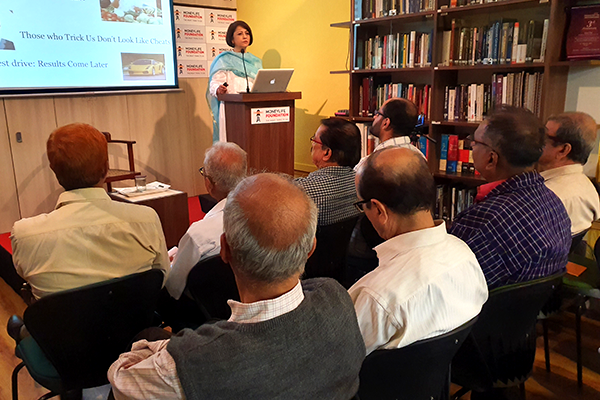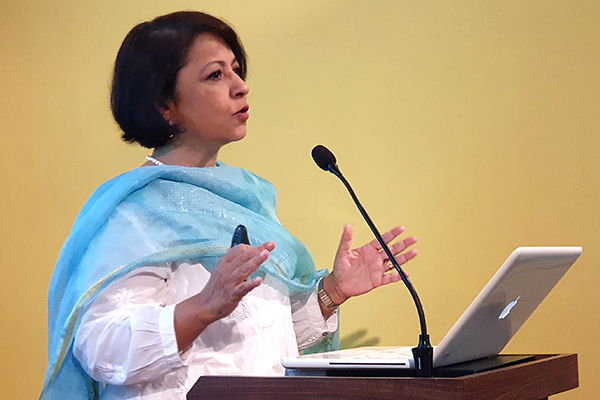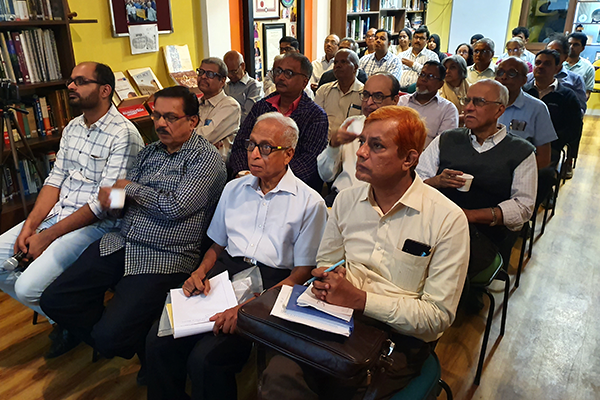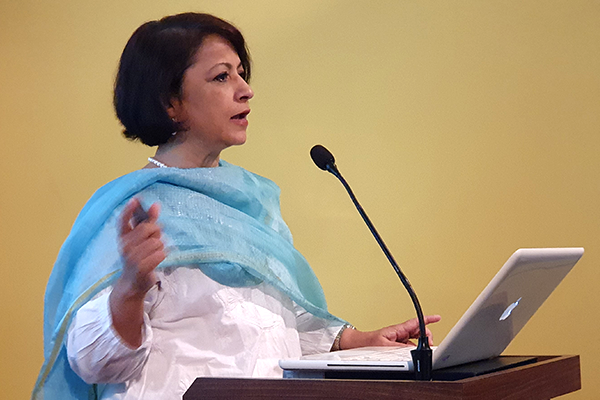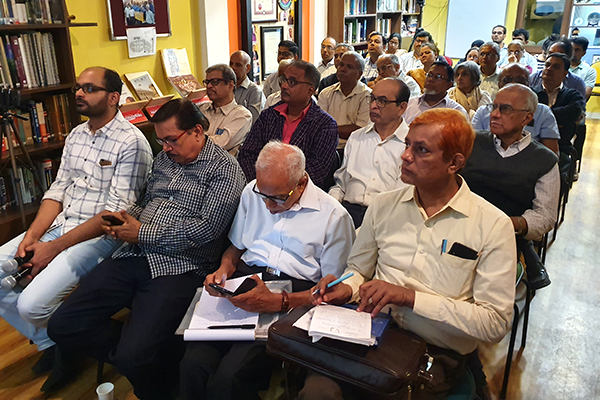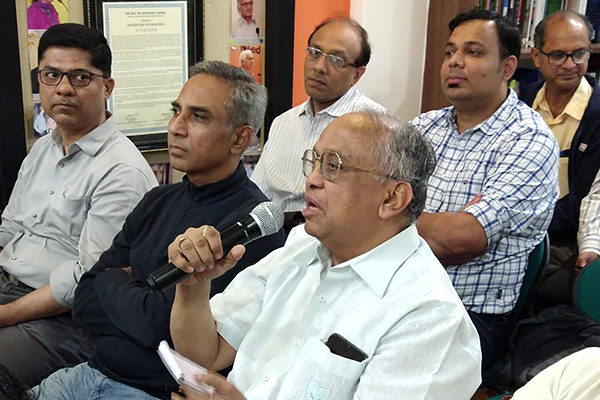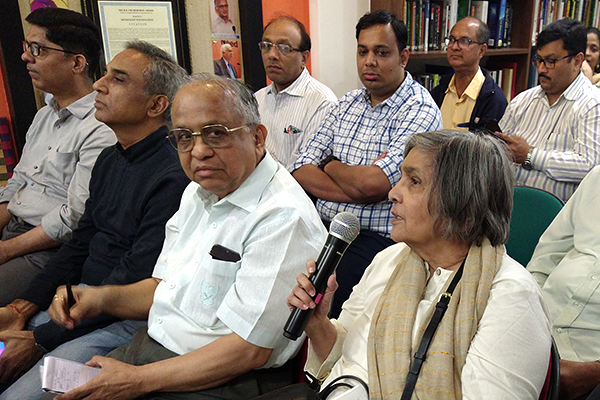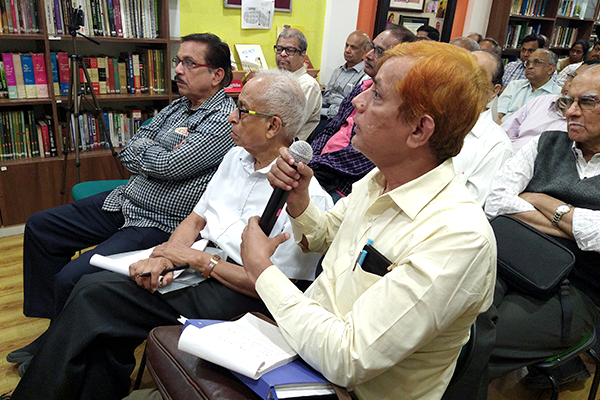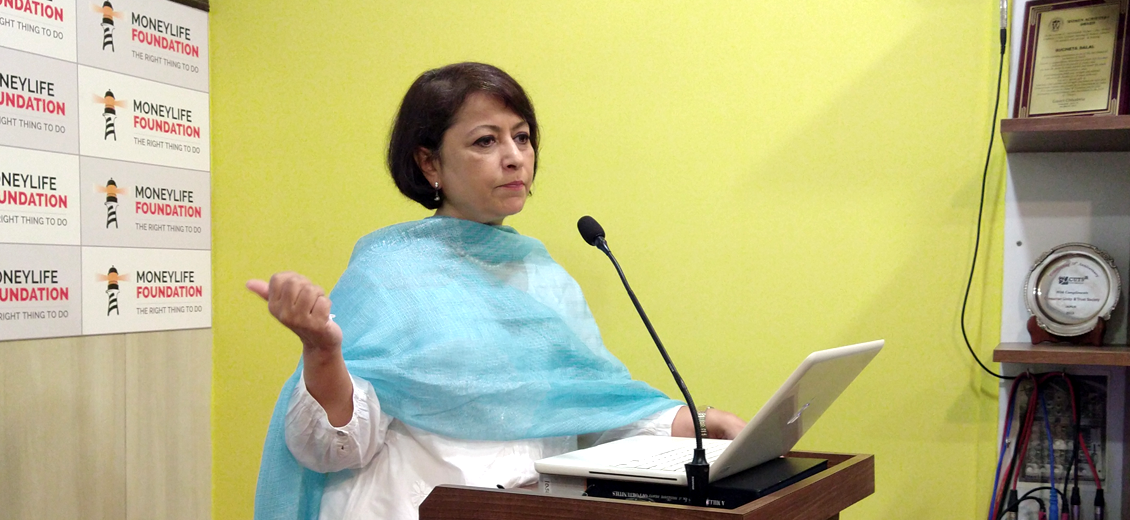
Ordinary people, who hope to invest their hard-earned savings safely, need to focus, first on avoiding losses and then ensuring that they earn a decent return. The key to this is to say a firm no to a vast array of financial products that are hard-sold to us by financial intermediaries. Just as important is to resist temptation and avoid scams that are positioned as lucrative investment opportunities.
This was the thrust of a presentation on 'Money Traps That Decimate Savings & the Revised Financial Sector Development & Resolution Bill 2019 (FRDS)" at Moneylife Foundation today.
The FSDR bill, which has been exclusively reported by Moneylife, may be introduced in the forthcoming budget session of parliament, may be just as controversial as the earlier FRDI (Financial Resolution and Deposit Insurance) bill that was withdrawn from parliament in 2018 after it triggered serious panic among people.
The five mantras, articulated by Ms Dalal, include: protect your money, insure for securing future, avoid credit and investment traps, focus on a few safe products, avoid emotional traps and maintain financial hygiene by either being fearful or sceptical and ask questions.
Quoting from a November 2016 seminar of investigating agencies, including Central Bureau of Investigation (CBI), Ms Dalal, says, "More than six crore Indians have a staggering Rs85,000 crore from 26 states to financial frauds."
"The biggest source of losses for Indians today is unregulated Ponzi, or multi-level marketing (MLM) or Pyramid schemes," she said, adding, "Any scheme that asks you to introduce two new investors or more to get the extraordinary returns is a Pyramid. In such schemes the promised returns are anywhere between 24% to over 100%. These people find women as easy targets. While the central government in July 2019 had passed the Banning of Unregulated Deposit Schemes Bill (BUDS) 2019, its implementation is still handled by state governments."
BUDS Act envisages an outright, nationwide ban on unauthorised deposit-taking and makes promotion and advertising of these schemes unlawful. It also criminalises unregulated deposits and there are specific provisions to confiscate proceeds of crime and refund depositors’ money. Due to the law, all schemes that are not specifically cleared under the Act will be banned, Ms Dalal added.
As a rule, she says, "Try and invest in products regulated by SEBI, RBI, IRDA, and PFRDA. While this is not a guarantee, but there is pressure on the regulators to act when something goes wrong. However, keep in mind that India has a poor grievance redress system and thus there is no alternative to being careful."
Responding on question about which is the best bank, Ms Dalal, a veteran journalist and founder-trustee of Moneylife Foundation, says, "Public sector banks (PSBs) are owned by the government and are relative safe. But this may change after the FRDS Bill. Larger private sector banks are also safe, but looking at what is happening at Yes Bank, we needs to be on alert. Cooperative banks like the PMC Bank are dangerous as they are under dual regulation and every month, one or the other cooperative bank fails. But soon, these banks may come under single regulation under the Reserve Bank of India (RBI)."
She also explained new banks like small finance banks and payment banks as well as peer-to-peer (P2P) lending. Especially warning about P2P lending, she says, "It is hard sold on the claim that you earn far more than a fixed deposit (FD) and can choose class of borrower. But this is a pretence of choice. For individuals, it is impossible to do due diligence and assessment before lending money from a platform. While there is a cap of Rs50 lakh on individual for P2P lending, who will monitor if the limit is breached? P2P industry association is already lobbying for increase this limit to Rs1 crore. But do we trust RBI to monitor this?"
Ms Dalal also explained unclaimed deposits, dormant or inoperative accounts and how one can reclaim the deposit or make the account operative.
Ms Dalal also touched upon the relationship managers from banks. She said, "Relationship managers usually work only to earn themselves fat commissions from your investments. Thus, most 'relationship managers' resort to mis-selling or hard-selling a product. In order to be safe, one should have all communication documented."
Ms Dalal also warned about signing blindly on any form or paper without reading and understanding it.
She asked the audience to pay attention to passwords, personal identification number (PIN) and one time passcodes (OTPs). "Don’t fall for FREE gifts, or coupons offered by strangers who want you to share OTPs. Don’t be in a hurry to download apps for freebies. There are innumerable fake emails that look very official and do not rush to click on links in such emails or messages. Be careful while spending money online for shopping or travelling. Also we need to beware of being cheated through online sales networks where buyers send QR codes or links to click. This is applicable for scamsters pretending to be employees seeking verification," Ms Dalal added.
Women tend to hold on gold as lifetime investment products, but when it comes to contingencies, they try to obtain a loan on this gold, which is not the right choice, Ms Dalal said. She informed the participants on different components of gold loan, like interest, processing and valuation charges, loan to value ratio and payback time.
Ms Dalal then explained about credit history, credit score and reports, which are becoming increasingly important. She said, all your borrowings and repayments for credit card, student or education loan and other loans, are tracked by credit information companies, like CIBIL, Experian, CRIF Highmark and Equifax.
The Bail-In Issue and FSDR Bill 2019
Ms Dalal also explained the audience the dangers of Financial Resolution & Deposit Insurance (FRDI) Bill that is being revised as Financial Sector Development & Resolution (FSDR) Bill. She says, "The earlier version of this bill triggered a panic among stakeholder, especially bank customers with its 'bail-in' clause. Bail-in allows deposits above an insured ‘threshold’ to be converted into equity to re-capitalize banks. In fact, in Lok Sabha, the finance minister had to reassure people that deposits were safe. Later in August 2018, the FRDI bill was withdrawn with an intention to rework and re-introduce."
However, she says, there is a ‘secret’ note from Atanu Chakraborty, secretary of economics affairs that talks about FSDR bill, which may be introduced in the upcoming budget session. "While India needs a financial resolution framework, the FSDR bill says there is a 'systemic vacuum'. FSDR is an umbrella legislation like Bankruptcy Act. The FSDR covers banks, insurance companies, financial market infrastructure, payment systems and other financial service-providers. It also provides specialised mechanism to resolve financial failure," Ms Dalal says.
In addition, she says, "the bill fixes holes in the FRDI bill and includes systemically important financial bodies like IL&FS. The FSDR also provides clear triggers at which resolution action will be triggered. There is a provision under FSDR to create a resolution authority (RA) to handle financial sector resolution. FSDR aims to work with existing financial regulators, who will prepare a resolution framework and when action will be triggered in their domain."
For such an important bill that would affect all financial consumers, Ms Dalal says, "Several ministries, financial sector regulators, Competition Commission of India and Indian Banks’ Association were consulted by the government, but no employee unions or depositors associations who will bear the brunt and are the largest stakeholders were consulted."
She also explained major differences between FRDI and FSDR bills. “The much criticised bail-in provision (in FRDI bill) has been removed and instead RA would be empowered to cancel or modify liabilities subject to safeguards in the FSDR. The insured deposit liabilities would not be cancelled or modified. Even internationally, insured deposits or those below a minimum threshold are not touched by ‘bail-in’. However, if the RA can ‘cancel or modify’ liabilities, then it is just another way of saying that the deposits will not be paid (cancelled) or can be converted (modified) into equity capital."
In the FSDR bill, while the higher insurance limit for deposits is not mentioned, media reports speculate it to be Rs15 lakh. "As per the secret note, a decision to simultaneously increase the deposit insurance cover from Rs1 lakh to a higher amount may be taken and that increased amount would be the floor for deposit insurance cover. The Resolution Authority would have power to modify this deposit insurance limit”.
"Can PSBs and cooperative banks afford higher premium cover on say Rs5 lakh or more in the current model? Banks, including cooperative banks will pay risk-based premium. Will this be on total deposit of insured deposit?" Ms Dalal asked.
Money traps that decimate savings:
The Revised FSDR Bill & It’s Implications:


